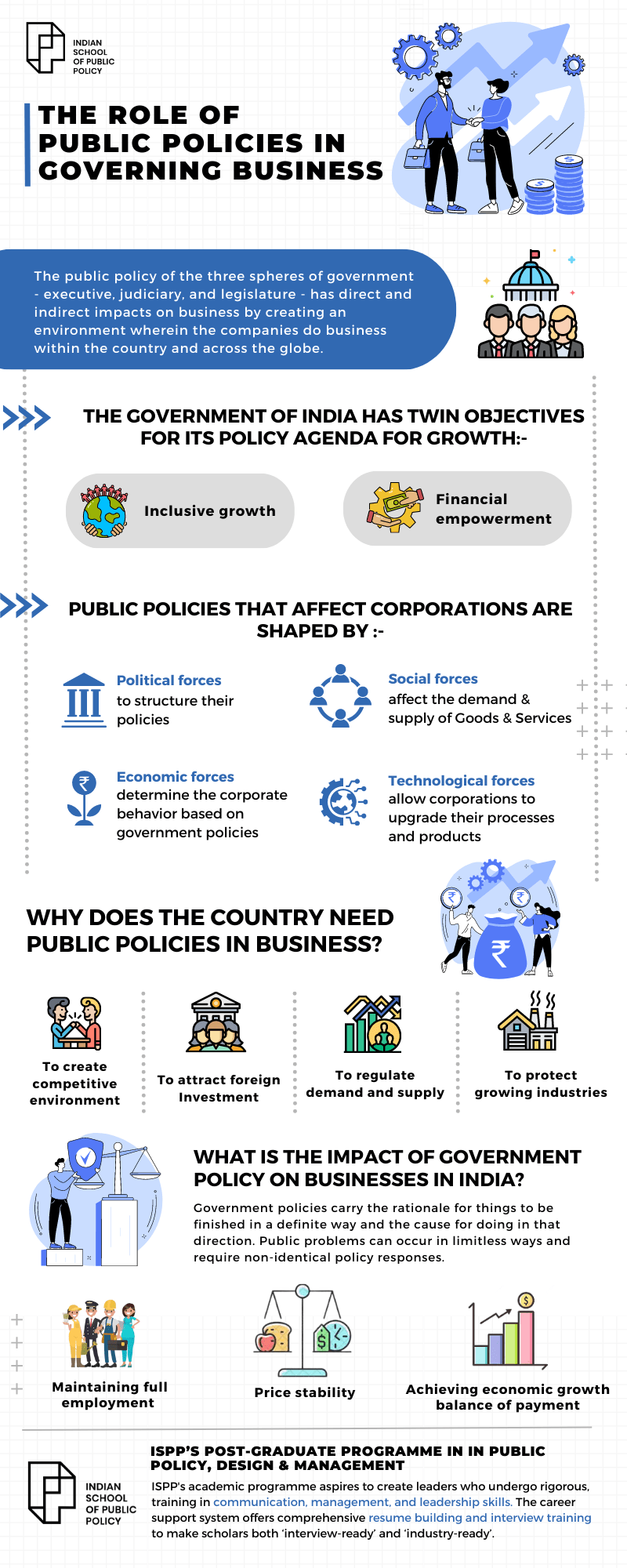
The Role of Public Policies in Governing Business

Public policies in India are more inclusive today, thanks to aware and responsible governance by a proactive government. The flip side of inclusivity is uncertainty; stimulated by policymaking that could become noisier, and stand the risk of being disrupted by populist causes.
Public policy in the Indian business context faces its litmus test in correctly harnessing the inclusive forces shaping it without allowing populist regulation to lead it astray. Thus, India has had reasonable success in achieving this harmony.
Public policy in the Indian business context is faced with the challenge of correctly harnessing the inclusive forces influencing it without allowing populist regulation to lead it astray. Hence, India has had reasonable success in attaining this harmony.
What Is the Role of Public Policies In Business?
The public policy of the three spheres of government – executive, judiciary, and legislature – has direct and indirect impacts on business by creating an environment wherein the companies do business within the country and across the globe.
The Government of India has the twin objectives of financial empowerment and inclusive growth as the centerpiece of its policy agenda for growth. It has implemented numerous policy initiatives in the sustainable development space, infrastructural improvements, job creation, digital transformation, ease of doing business, banking and financial services, manufacturing, and service industries to build a strong base for the Indian economy. It is crucial to understand the importance of creating a nurturing ecosystem for business and entrepreneurship, policies have been created to ease the entry of FDI – foreign direct investment, streamline the financial system, discard redundant procedures, and add clarity to the process of doing business.
Public policies that affect corporations are shaped by –
- Political forces – have an impact on how governments are prompted to structure their policies affecting corporations.
- Social forces – include the population composition that affects the demand and supply of goods and services that the corporations deal in; social forces include patterns of living and lifestyle that dictate the corporate strategies to cater to the whims and fancies of the consumers.
- Economic forces – are those that determine corporate behaviour along with the reaction of the government to solve the problems arising, therefore.
- Technological forces – are crucial for shaping corporate policies as they allow corporations to upgrade their processes and products, and help them meet competition.
It is crucial to understand the importance of creating a nurturing ecosystem for business and entrepreneurship, policies have been created to ease the entry of FDI – foreign direct investment, streamline the financial system, discard redundant procedures, and add clarity to the process of doing business.
Register your Interest to Study at ISPP
Why Does The Country Need Public Policies In Business?
- To create a competitive environment – Public policies help the market to have competition by creating a competitive market mechanism, or by controlling monopolies through licenses. It helps in providing a field for enterprises to operate and encourage companies to efficiently and effectively utilise the available
- To attract foreign investment – Government plays a role in facilitating foreign investments in certain industries that are critical for the country, for example – the government facilitated the setting up of a plant to manufacture Apple iPhones. Thus, the government tries to help transnational and multinational corporations to facilitate investments. Sometimes the government may like to protect domestic businesses by restricting the entry of foreign companies in certain sectors. .eg retail.
- To regulate the demand and supply of certain goods and commodities – the government might also adopt protectionist as well as promotional policies for the reasons below –a) To protect the growing industries, the government may enact policies to prevent the free flow of goods to and from other countries, tax holidays, and more.
b) To regulate demand and supply where resources are scarce.
c) To regulate prices in a healthy environment via administrative pricing mechanisms to promote consumer product safety and excessive pricing
d) To protect the environment through anti-pollution measures and effluent treatment. - The Fiscal Policy – Governments set up policies that lead the way to businesses. The government can alter the fiscal policy, which provokes changes in subsidies, regulations, taxes, commerce, interest rates, licensing, and more. Businesses should be flexible enough to adopt these changing rules and policies.
- To create a competitive environment
- To attract foreign investment
- To regulate the demand and supply of certain goods and commodities
- The Fiscal Policy
Also read: Why Study Public Policy? What Makes It Important Now More Than Ever?
What Is The Impact of Government Policy on Businesses in India?
Government policy is the backbone for tasks to be carried out and business to be concluded definitively. Government policy provides a framework through rules, regulations, and laws that ensure a level playing ground for all players. It also could be connected to promoting a business or then creating protection from external exploitation.
Government policies could be applicable on a macro or then at a local level. In that respect, the policy is formulated at the country, state, and local levels too. This translates into action that has a direct bearing on the successful running of the economy. Policy for public spending and private investment is one of the key drivers of economic growth and development. In another key function, Governments derive their revenue from taxes. Policy for taxation forms another key function of public policy and due thought needs to be given by policymakers in this regard
Government policies carry the rationale for things to be finished in a definite way and the cause for doing in that direction. Public problems can occur in limitless ways and require non-identical policy responses.
What Is ISPP?
The Indian School of Public Policy has been built by the world’s leading policymakers, experts, and influencers. ISPP aims to transform the art of policymaking, and hence, the institution has been founded on the commitment to extensive industry linkages, world-class faculty, and an innovative approach towards the design and management of policy.
ISPP creates leaders who undergo a rigorous programme in public policy, with expertise in communication, management, and leadership skills. The career support system encompasses a set of resume-building and interview training to raise scholars from being ‘interview-ready’ to ‘industry-ready’.
ISPP has a placement team encouraging scholars to widen their horizons and explore prospective career paths. They are dedicated to propelling scholars in their areas of interest.
The Indian School of Public Policy creates leaders who undergo a rigorous programme in public policy, allowing them to get placed in reputed organisations.
Register your Interest to Study at ISPP
FAQs
What are the Public policies that affect corporations shaped by?
Public policies that affect corporations are shaped by –
- Political forces – have an impact on how governments are prompted to structure their policies affecting corporations.
- Social forces – include the population composition that affects the demand and supply of goods and services that the corporations deal in; social forces include patterns of living and lifestyle that dictate the corporate strategies to cater to the whims and fancies of the consumers.
- Economic forces – are those that determine corporate behaviour along with the reaction of the government to solve the problems arising, therefore.
- Technological forces – are crucial for shaping corporate policies as they allow corporations to upgrade their processes and products, and help them meet competition.
What Is The Impact of Government Policy on Businesses in India?
From national to local, government policies are material at all levels, such as states and municipalities. These local authorities have their own sets of laws. Governments get revenue to pay out from taxes. Increased disbursement calls for an increase in taxes or borrowing. Any undue tax increase will stifle investment. Increased expenses also exhaust the limited pool of funds, resulting in less money for private investment.
Why does India need public policies in businesses?
- To create a competitive environment
- To attract foreign investment
- To regulate the demand and supply of certain goods and commodities
- The Fiscal Policy
What is the role of public policies in governing business in India?
The Government of India has the twin objectives of financial empowerment and inclusive growth as the centerpiece of its policy agenda for growth. It has implemented numerous policy initiatives in the sustainable development space, infrastructural improvements, job creation, digital transformation, ease of doing business, banking, financial services, manufacturing, and services industries to build a strong base for the Indian economy. It is crucial to understand the importance of creating a nurturing ecosystem for business and entrepreneurship, policies have been created to ease the entry of FDI – foreign direct investment, streamline the financial system, discard redundant procedures, and add clarity to the process of doing business.
Check Infographics



